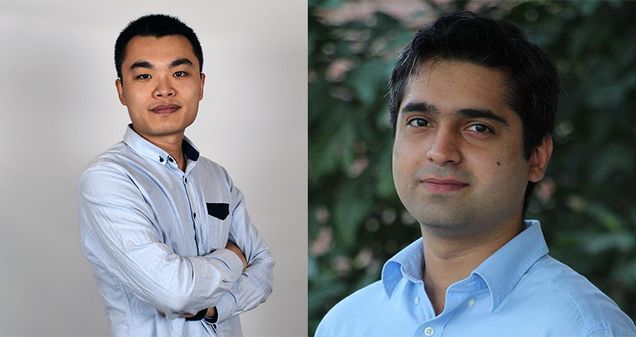ECE PhD Interns on FPGA and Machine Learning
An internship at ALCF provides real world experience for Yang and Sanaullah
By Shereen Abubakr (QST ’18)

ECE PhD Students Chen Yang (ECE ’19) and Ahmed Sanaullah (ECE ’20) worked together while interning at the Argonne Leadership Computing Facility (ALCF). A highly regarded organization that offers a selective internship program, the ALCF provides supercomputing capabilities to the scientific and engineering community. It is a U.S. Department of Energy affiliate.
As intern research aids, Yang and Sanaullah were tasked with exploring the use of FPGAs to accelerate the processing speed of machine learning applications. In just three months, the pair developed a prototype for a machine learning process engine. Their work was accepted for publication in the BMC Bioinformatics special issue journal, under the title “Real-Time Data Analysis for Medical Diagnosis using FPGA Accelerated Neural Networks.” Their research achievements were also featured in HPCWire, a publication that delivers news focused on high-performance computing applications in science, engineering, financial modeling, virtual reality, and databases.
With the potential to provide higher performance than today’s HPC processors (CPUs and GPUs) using less power, field-programmable gate arrays (FPGAs) are a promising technology for future supercomputers. But FPGAs have yet to gain much traction in HPC because they are notoriously difficult to program.
“FPGAs represent a paradigm shift in mainstream high-performance computing that addresses three of the most important challenges on the roadmap to exascale computing: resource utilization, power consumption and communication,” said Ahmed Sanaullah, a Ph.D. student at Boston University. “The icing on the cake is that FPGAs are commercial off-the-shelf devices. Anyone can create their own clusters using FPGAs, and they scale much better than GPUs.”
“This experience gave me a lot of insight into HPC workloads and deep neural networks,” Sanaullah said. “Moving forward, I hope to incorporate this into my future projects, including my dissertation, so that my work can contribute to HPC architectures and applications in a significant and meaningful way.
HCP Wire, October 24, 2017, “ALCF Summer Students Gain Real-World Experience in Scientific HPC”
Yang and Sanaullah are ECE PhD students and Computer Architecture and Automated Design (CAAD) Lab Research Assistants. The CAAD Lab works on research projects with the Argonne National Laboratory (ANL), which is an ALCF affiliate. BU ECE Professor Martin Herbordt is the Principal Investigator of CAAD Lab and introduced Yang and Sanaullah to the ALCF internship opportunity. Yang joined CAAD in 2014, and works on high-performance communication design on FPGA-centric clusters. Sanaullah became a member in 2015. He is focused on designing MPI infrastructure for multi-FPGA systems.